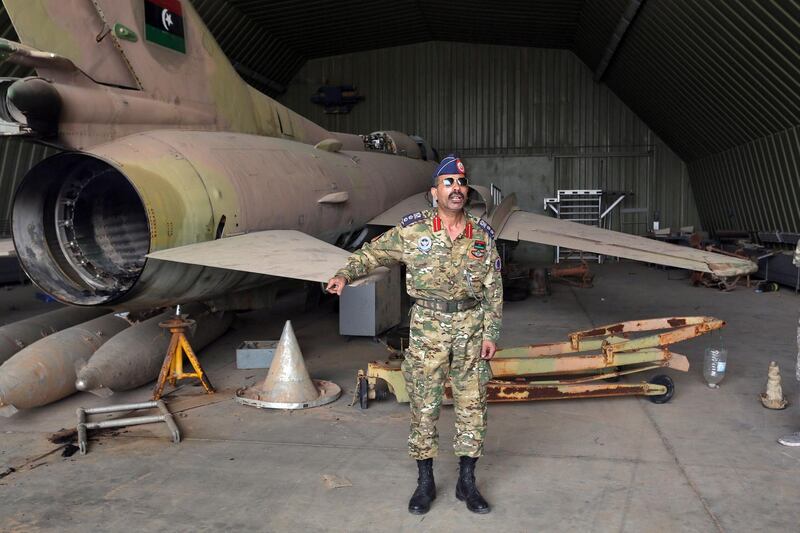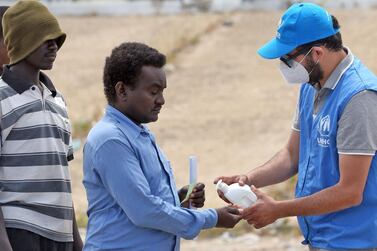The seizure of a key base in western Libya by forces aligned with the Tripoli Government of National Accord risks plunging the county into “a pure proxy war”, the UN has warned.
The acting UN envoy to Libya, Stephanie Williams, told the Security Council by video that the situation was becoming more dire and about a million people in the country now needed some form of humanitarian assistance.
“I had hoped to be able to deliver a more positive report to you today," Ms Williams said.
"But unfortunately, just when we think the bottom has been reached in Libya, we somehow manage to achieve new depths of violence, heartlessness and impunity.”
She said there had been “no lull” in the fighting despite pleas for a ceasefire to help tackle the coronavirus outbreak.
“After repeated attempts, supported by multiple air strikes conducted by drones, GNA forces took control of the airbase yesterday on May 18," Ms Williams said.
"The control of this strategic airbase may trigger further escalation, turning the Libyan conflict into a pure proxy war."
On Monday, the Libyan National Army, whose powerbase is in eastern Libya, announced it had withdrawn from areas around the capital early on Tuesday after abandoning the key Al Watiya air base to militias who back the GNA.
LNA spokesman Ahmed Al Mismari said on Tuesday that the base had been abandoned as part of a long-planned strategic decision and that only old, obsolete equipment was left there.
Mr Al Mismari said the force had carried out a "redistribution and repositioning in the battle fronts, disengaging from some crowded residential areas".
After extensive Turkish support, fighters who back the GNA said on Monday that they had captured the base south-west of the capital.
In the process, they claimed to have seized a large number of weapons systems and huge caches of arms.
The LNA, led by Field Marshal Khalifa Haftar, launched an operation to take the capital from the GNA led by Fayez Al Sarraj.
They said they aimed to end the rule of the rag-tag coalition of militias that run security for the Tripoli government and include – according to international experts and officials – factions linked to extremist groups. The country has descended into violence since the 2011 uprising against Muammar Qaddafi, and subsequent Nato military campaign.
This crisis has been going for almost ten years; Libyans will not have the chance to create a stable or prosperous country until combatants aim higher than tactical territorial gains. These are mirages of victory and no substitute for a political process.
— د. أنور قرقاش (@AnwarGargash) May 19, 2020
Before the offensive on the capital, the LNA already took large areas of the south and parts of the west near the Tunisian border. However, the fighting around Tripoli has been locked in a near stalemate for over a year. In January, Turkey moved to bolster Mr Al Sarraj's forces sending thousands of Syrian mercenaries as well as Turkish military trainers, experts and equipment to assist in the fight.
On Tuesday, UN Envoy to Syria Geir Pedersen told the Security Council that the transfer of fighters from Syria to Libya was "deeply troubling" but declined to comment on the scale.
As well as acting as a rear base for supplies and to muster fighters, the Al Watiya airbase was used for LNA warplanes to carry out bombing runs on GNA-militia positions.
Wolfram Lacher, a senior associate at the German Institute for International and Security Affairs in Berlin, described the airbase as the LNA's "last foothold on the [western] coastal plain".
In recent weeks pro-GNA forces had stepped up air strikes against LNA fighters, targeting their supply lines around Al Watiya.
"Today's success is not the end of the battle but it brings us closer than ever to victory," Mr Al Sarraj said as he announced the news.
Prior to seizing Al Watiya, GNA forces pounded it from the air using drones supplied by Turkey, while also bombarding the town of Tarhuna.
Hamish Kinnear, an analyst for Verisk Maplecroft, said: "Once again, the GNA's advances were enabled by extensive Turkish military support".
GNA forces spokesman Mohamad Gnounou said loyalists had destroyed three Russian-made anti-aircraft systems in the airbase since Sunday, before the missile defences could be deployed.
GNA commander Mohamad Gammoudi said the final attack on Al Watiya was launched at dawn Monday, with air support, as the base was surrounded on three fronts.
LNA forces had controlled Al Watiya since 2014, and used it as a launchpad for air attacks on GNA positions.
Mr Lacher said the withdrawal of LNA fighters from Al Watiya would ease pressure on GNA forces.
The capture of the base "frees up GNA forces from western cities to move to frontlines south of Tripoli.
"It also strengthens the sense among anyone except Haftar's true believers that his war is unwinnable," he added.
In January, world leaders committed to ending foreign meddling and to upholding a 2011 weapons embargo, but the UN has warned that both sides have continued to receive arms and fighters.
Strikes have targeted civilian infrastructure and hospitals. Tripoli's only working airport, Mitiga, has been used by GNA warplanes and repeatedly comes under attack.
The UN says the battle for Tripoli has left hundreds dead and displaced more than 200,000 people.







